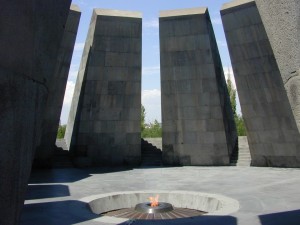 There are times when we move swiftly through the days of our lives without ever considering the answer to, “Where did they come from?”
There are times when we move swiftly through the days of our lives without ever considering the answer to, “Where did they come from?”
After becoming a caregiver for my father, I learned to ask this question with each elder I met. He could be an elder waiting for the light to change on a street corner so he could cross. She could be sitting in a chair in the hallway of a nursing home.
Where did s/he come from?
Our elder’s lives (like our own) are rich with history, fraught with struggles, and filled with joys. If we take time to learn from them, we will receive countless gifts that will help us to live better lives.
Such is the journey I took to understand my parents’ past–both survivors of the first genocide attempt in the twentieth century.
Remembering the Armenian Genocide
April 24th, 2014 marks the 99th anniversary of Armenian Martyr’s Day. An estimated 1.5 million Armenians were massacred by the Turks starting in 1915 and ending in 1923. That number is almost half of the Armenian population of that time.
Both of my parents survived. Although, they didn’t speak of it, I pieced together the atrocities by visiting the National Archives in Armenia and talking with my relatives.
At age eight, my father saw his father for the last time. He didn’t know it then. He and his mother made their way from Van, a prominently Armenian town in Turkey to Constantinople where, two years later, they sailed to America. They appear on the Ellis Island Registry. A decade and a half later, my father became a citizen of the United States.
In the early 1920s, (birth certificates in war-torn regions were hard to come by); my mother was born in another predominately Armenian town in Turkey. When she was just a baby, her family was driven out of their homes and into the Syrian Desert. They survived and settled in Aleppo. (She’d often speak of the highlights of her childhood in “Haleb.”) It’s sad to see what is happening in Syria, today. They later moved to Beirut (Lebanon). As members of her family came to the United States, they helped lay the groundwork for her to arrive in America by the time she was in her late twenties. She settled with her family in Chicago when she met an eligible bachelor, who at age 40 finally tied the knot.
And that in brief is where they came from and the foundation of how I came to be in this world.
When you look at your parents and your aunts and uncles, do you wonder where they came from? How about elders you do not yet know?
As caregivers, we cannot assume we know one’s past. Their past, like ours, helps shed light on the present. And realizing the obstacles my parents overcame helps me to understand why it was so important for them to see their children succeed in our land of birth.
What about the elders in your life? Where did they come from?









So true that we always learn A LOT when we ask that question. And bravo to you and your parents for remembering and important part of their history–and the world’s.
Thank YOU, Chef Tinky.